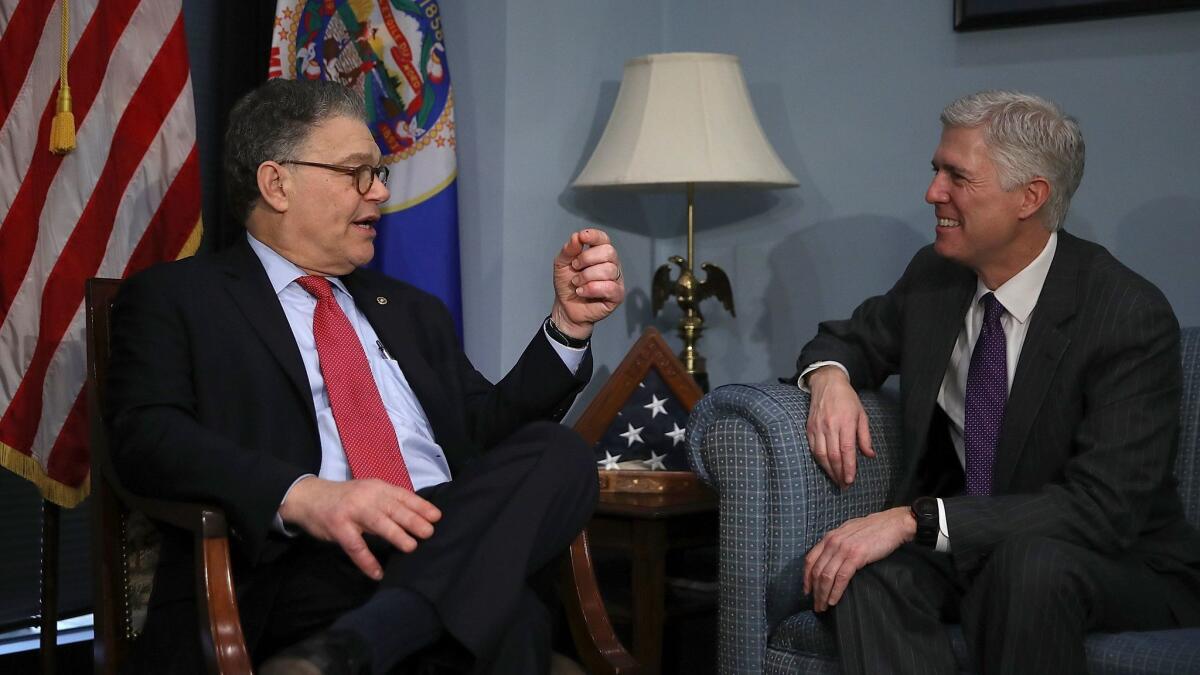Senate battle over Supreme Court nominee Neil Gorsuch has been relatively mild, but that’s about to change

- Share via
Reporting from Washington — Confirming President Trump’s nominee for the Supreme Court was expected to be one of the biggest battles of the year, but something happened on the way to the committee hearing room to make it a relatively muted one — at least so far.
Ad campaigns have been minimal. Protesters are at bay. And then there is Judge Neil Gorsuch himself, the silver-haired 10th Circuit appellate justice whose professional courtesy and grounded Western roots have made him a tough target for opponents to attack.
Expect that to change on Monday when the Senate Judiciary Committee launches four days of hearings to determine whether Gorsuch will win the votes needed for confirmation.
Democrats have been waiting for this moment to unleash their skepticism of Gorsuch as a proxy battle against Trump, whose administration they say makes an independent judiciary more important than ever.
Trump’s criticisms of the judicial branch, his ethnicity-based attack on a Latino judge and his willingness to push legal bounds with two travel bans now blocked by courts raise the stakes for a high court seat that will help serve as a final check on the administration’s policies, they say.
“Judge Gorsuch has a special responsibility to reassure the American people that he will be an open-minded and independent jurist,” said Sen. Richard Blumenthal (D-Conn.), a former U.S. attorney.
Democrats have spent the past month engaging Trump on other fronts — over his plans to repeal Obamacare and his associates’ ties with Russia.
How the Senate’s once-revered traditions are falling victim to partisan divide »
But as the hearings begin, so will the battle. Outside groups are planning to flood the phone lines at Senate offices, much as they did during the confirmation votes for Trump’s cabinet nominees. Others are scrutinizing Gorsuch’s record, particularly on abortion rights, gay marriage and Obama’s immigration orders that that have been pivotal for the court.
Opponents will be making the case that Gorsuch often has sided with big moneyed interests over ordinary Americans, and they will be highlighting his longtime association with Denver billionaire Philip Anschutz.
“Judge Gorsuch may act like a neutral, calm judge, but his record and his career clearly show that he harbors a right-wing, pro-corporate special-interest agenda,” Senate Minority Leader Charles E. Schumer (D-N.Y.) said at a news conference. “He expresses a lot of empathy and sympathy for the less powerful, but when it comes time to rule, when the chips are down, far too often he sides with the powerful few over everyday Americans trying to just get a fair shake. We’ve seen that play out time and time again.”
Confirmation fights often diverge from routine partisan skirmishes because traditionally many senators are inclined to support a president’s nominee, regardless of party, as long as the choice is competent and qualified.
But this Supreme Court battle took on an unusually partisan edge after the seat became vacant last February with Justice Antonin Scalia’s death.
In a stunning move, Senate Republicans refused to consider Obama’s choice for the court, Merrick Garland, blocking his hearings and confirmation vote so the next president could fill the seat. That left the court operating with a vacancy for most of 2016, as it has since.
Democrats vowed to retaliate with their own hardball tactics after Trump won the White House.
So far, though, things have been running largely in favor of Gorsuch as outside groups, including the conservative Judicial Crisis Network, poured $4 million into ads supporting the president’s pick.
Gorsuch’s conservative views have been compared to those of Scalia, but he presents himself as a more mild-mannered, amiable contemporary.
With Republicans holding 52 seats in the Senate, Gorsuch will need to scoop up eight Democratic votes to reach the traditional 60-vote threshold for confirmation.
“Anyone seriously reviewing the judge’s record finds that he is a fair and independent judge,” Carrie Severino, chief counsel at Judicial Crisis Network, said in a statement. “Judge Gorsuch’s mainstream approach to the law has earned him widespread bipartisan support from conservatives and liberals, as well as from his colleagues and former Obama administration officials.”
It remains to be seen how far Democrats will go in opposing Gorsuch. They have been concerned that if they block him with a filibuster, Republicans might invoke the so-called nuclear option to change Senate rules and lower the threshold to allow confirmation with a simple 51-vote majority.
Senate Majority Leader Mitch McConnell has promised that Trump’s nominee will be confirmed, all but acknowledging his willingness to go nuclear, if needed. Democrats worry about the precedent that would set for future court vacancies.
Liberal groups, though, have pressured Democrats to focus their attention on the Gorsuch battle, not future ones, and some Senate Democrats appear more willing to do so.
ALSO
White House aides who wrote Trump’s travel ban see it as just the start
More coverage of politics and the White House
More to Read
Get the L.A. Times Politics newsletter
Deeply reported insights into legislation, politics and policy from Sacramento, Washington and beyond. In your inbox twice per week.
You may occasionally receive promotional content from the Los Angeles Times.











